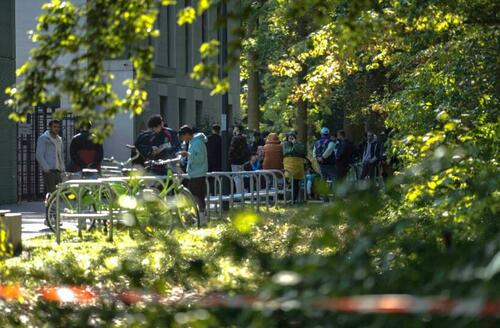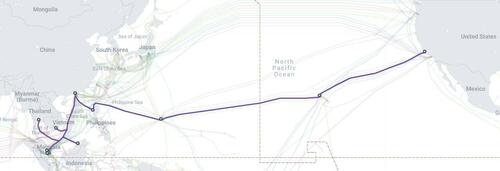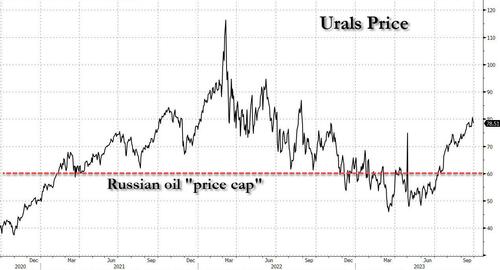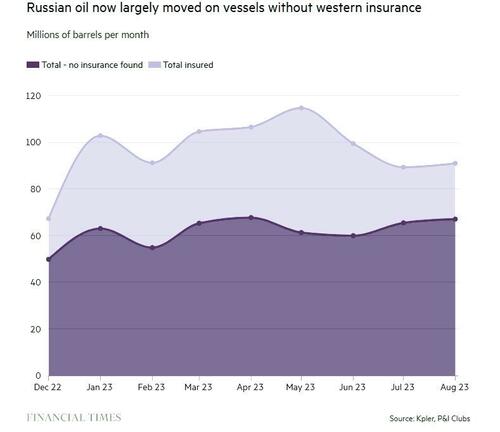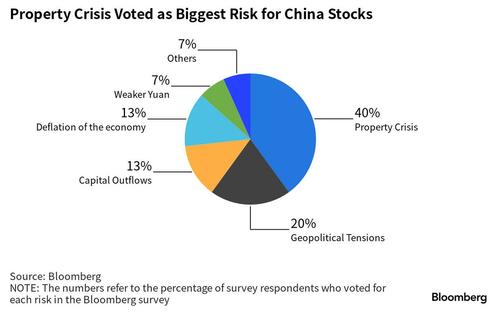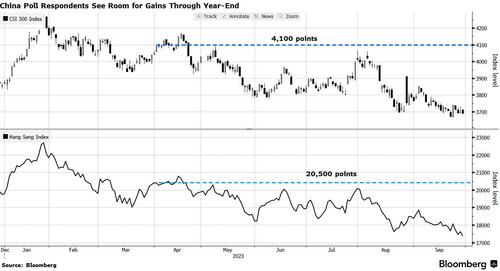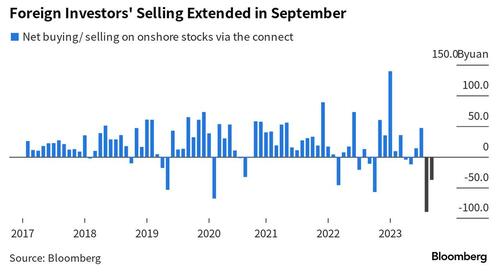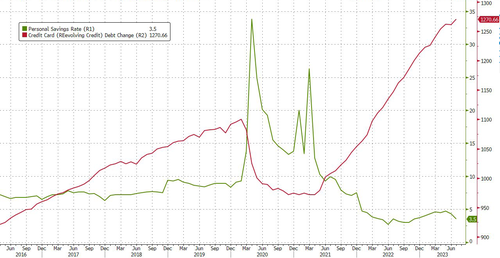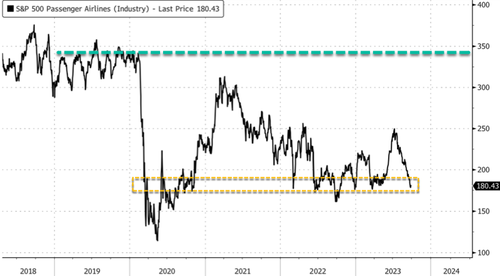Authored by Maximilien Lacour via The Brownstone Institute,
On Monday 16th of March 2020, when Boris Johnson first proclaimed, “You must stay home,” I very meekly said “OK!” And the chances are that you did too.
Polling from the time shows that self-reported compliance with the stay-at-home orders was high – a finding broadly corroborated by mobility data, which has the marked advantage of not depending on respondents’ honesty about following the law (Ganslmeier et al. 2022; Jackson and Bradford 2021).
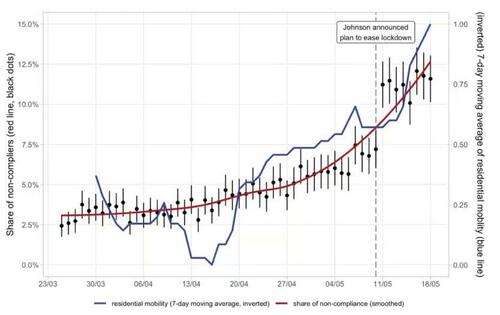
In itself, however, this data alone does not tell us why an unprecedented suspension of our civil liberties enjoyed such high levels of compliance.
There are, however, surveys that do provide some insight (see, for example, Jackson and Bradford 2021; Foad et al. 2021; and Halliday et al. 2022) and amongst their more surprising findings is that instrumental considerations – that is, personal fear of the virus or of coercion by the State – may have been relatively unimportant in driving compliance with the lockdown rules. Instead, they found that, in general, people followed the rules because (1) they were the law and (2) because they provided us with a shared understanding of what was good and right to do, which many of us seem to have internalised (Jackson and Bradford 2021).
The first of these is not particularly surprising. The law enjoys a ‘reservoir of loyalty’ amongst Brits who are therefore already predisposed to respect its edicts just because they have been made law (Halliday et al. 2022, p.400).
This, however, does not explain the second driver of compliance. That is, it does not explain why we bought into lockdown laws and willingly accepted them as the basis of our public morality – to the point that we even often justified our non-compliant behaviours as nonetheless remaining within the ‘spirit of the law’ (Meers et al. 2021). It does not explain why we looked upon the sanitised, terrorised redrawing of society and saw that it was good. It is worth briefly revisiting, with the benefit of cooled heads and hindsight, what exactly this looked like.
Over the course of a week or so, our lives and concerns were dyed a COVID monochrome and narrowed down around a single, shared priority – slowing the spread of the novel coronavirus, or, in the stock phrases of the time, “flattening the curve” and “bringing R below 1.” And, to achieve this, we were asked to abandon almost every single activity that make up our shared lives and distinguish us from battery-farmed animals, including but not limited to, seeing friends, going to school, shopping, going to the theatre, playing team sports, meeting for romance or sex, and just hanging about (Wagner 2022, p.61).
In a way, it also radically simplified our lives.
Under the radical, bewildering uncertainty of early 2020, the lockdown rules saved us from having to negotiate the perils and ambiguities of being mortal amongst mortals in time of plague, by telling us what we needed to do in most cases. Want to see Grandma? Simple! You can’t. Want to go shopping? Essentials only and follow taped lines across the floor! Want to continue an affair with the milkman or just see your girlfriend? Well, again, you can’t – and pray that you don’t live in Leicester.
Borrowing a term from moral philosophy, the lockdowns introduced a decidability (or, at least, the illusion of it) into our lives that would otherwise have been absent (Taylor 1997). Under its sway, we no longer had to engage with our lives as moral agents tasked with making imperfect judgements about what is right or wrong, as we could assume that those judgments had already been made by a higher authority and were reflected in its rules. Life under lockdown settled all philosophical difficulties and faced with a course of action, one wasn’t to ask, “Is this the right?” but “Does this Flatten The Curve?”
This decidability may go some way to explaining why we internalised the lockdown worldview so easily. In his 2005 essay, “Afraid to be Free: Dependency as Desideratum,” James Buchanan identified a widely shared set of expectations that he termed ‘Parental Socialism’ and described as:
… paternalism flipped over, so to speak. With paternalism we refer to the attitudes of elitists who seek to impose their own preferred values on others. With parentalism, in contrast, we refer to the attitudes of persons who seek to have values imposed upon them by other persons, by the state or by transcendental forces. (Buchanan 2005)
Buchanan very loosely defines socialism as the range of political projects that seek to impose some kind of collectivized control over the individual’s liberty of actions and provides a list of its possible sources, which includes parental socialism. Unlike the other sources identified by Buchanan, however (which have to do with the structure and powers of the State), parental socialism concerns the expectations that citizens have of said State. Freedom and agency, observes Buchanan, come with responsibility.
A free agent is forced to struggle with the complexities and ambiguities of his life and to come to a judgement about what matters – and bears responsibility for both struggle and judgement. This, observes Buchanan, is a heavy burden that many people are simply too afraid to shoulder. Instead, they (i.e. parental socialists or, more simply, us!) demand that the State be an engine of order and certainty in their worlds, much like a parent is in their child’s, and that it make and impose these judgments upon them. Parental socialists want to be told what matters by the State, told what is safe and right and what is risky and wrong, not given the freedom to deliberate themselves.
This amounts to demanding the sort of decidability provided by stay-at-home orders and, of course, means compromising on some of one’s freedoms. If Buchanan’s diagnosis is correct, we may have accepted the lockdowns because they fit with a long-standing pattern of expectation that we have of the State. Though the pandemic-management policies themselves were unprecedented and shocking, the role they gave to the State in our lives was not entirely, and thus may help explain why we accepted them so readily.
Now, this sits at odds with much of what is written by critics of lockdowns. For many of these (otherwise often insightful) writers, the lockdowns were an essentially top-down phenomenon, primarily driven and maintained by the machinations of politicians, scientific advisors, or some more obscure elite group. Explanations of this sort range from the conventional, like Laurent Mucchielli’s analysis of the French government’s centralising predisposition and the perverse incentives shaping WHO recommendations to the more unorthodox, like Michael P. Senger’s argument that Xi Jinping deliberately shut down the world on the pretext of a benign virus (Mucchielli 2022; Senger 2021).
However, if what I wrote above is correct, then, while these theories are not necessarily incorrect per se (well, Mucchielli’s isn’t), they are necessarily limited by their failure to consider the role of bottom-up forces like parental socialism in driving compliance with the lockdowns. They do not do justice to the way that lockdowns were both continuous with and made possible by a set of long-standing, popular expectations that we have of the State.
This omission risks having deleterious consequences for the project of lockdown critique, assuming that its goals include preventing any future lockdowns. If lockdowns were made possible by popular parentalistic expectations, then legal reform, though obviously welcome, may prove insufficient and powerless against the very real threat of ‘voluntary’ lockdowns, whereby a population complies with a stay-at-home request without needing it to be made a legal requirement.
Consider the comments made by David Halpern, a prominent behavioural scientist and Chief Executive of the UK government’s notorious ‘Nudge’ unit, and reported in the Telegraph:
Britain has been drilled to comply with lockdown under a future pandemic, the chief executive of the ‘nudge unit’ has said.
Professor David Halpern told the Telegraph that the country had “practised the drill” of wearing face masks and working from home and “could redo it” in a future crisis.
Speaking on the Lockdown Files podcast, the government adviser Prof Halpern predicted that the country would comply with another ‘stay at home’ order because they “kind of know what the drill is.”
In an interview given before Mr Hancock’s testimony, the leading behavioural scientist even suggested that the nation’s prior experience made it “much easier to now imagine” the population would accept future local restrictions.
Having been trained up by a first round of stay-at-home orders, our previously abstract paternalistic expectations of the State have been given a new form: in times of plague, lock down! Though Halpern does not say this explicitly (he still refers to a stay-at-home ‘order’), his remarks nonetheless suggest that future lockdowns may not even need to be legally mandated – we will just know what to do when recommended to by the State or Public Health.
The threat of voluntary lockdowns should lead lockdown sceptics to cast their net beyond the institutions of the State and bring them to confront the harder-to-limn, bottom-up drivers of lockdown like parental socialism. They need to find ways of addressing our collective self-infantilisation and to reemphasize the value and importance of free agency.
This does not mean rejecting any role for the State in our lives or condemning any socialist scheme (Buchanan himself is quite clear that his critical project remains compatible with aspects of social democracy such as redistribution through taxation). But it does mean trying to foster and perpetuate a popular scepticism of the State in its didactic and moralising functions. Critics of lockdown need to go beyond criticising the public institutions and individuals who designed COVID-19 policy, and to start attacking the popular mindset that made them thinkable and practicable in the first place.
